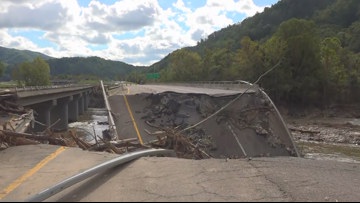- Watering trees is a must to protect them from severe weather and drought
- At least 4 dead, hundreds rescued after deadly floods ravage South Texas
- Today on Texas Standard: Deadly floods swamp South Texas, shatter records
- North Carolina radio station was a critical lifeline after Hurricane Helene. Then it became the voice of recovery.
- As storms approach, Rock Hill residents look back on last April's devastating hailstorm
I-40 will remain closed for 'months' at the TN state line after catastrophic flood damage

Historic flooding in East Tennessee and North Carolina swept away a part of I-40 East near the state line on Friday.
KNOXVILLE, Tenn. — The only two direct interstate routes between Tennessee and North Carolina are going to be cut off for a long time, transportation officials said Tuesday.
Interstate 40 in North Carolina’s Pigeon River Gorge and Interstate 26 in Erwin, Tennessee both suffered massive damage from Hurricane Helene’s catastrophic flooding.
On I-40 in North Carolina, a section located three miles from the Tennessee state line partially collapsed into the Pigeon River. Aerial footage showed missing chunks of the interstate on the eastbound side that runs along the river.
On I-26 in Unicoi County, Tennessee, flooding destroyed both sides of the interstate bridge that runs over the Nolichucky River in Erwin.

The repairs needed to I-40 will take “months” at a minimum, according to the North Carolina Department of Transportation. That means drivers will need to plan for lengthy detours if they intend to drive between North Carolina and Tennessee.
NCDOT said it is working on mapping detour routes, but said it’s likely most traffic will have to enter North Carolina and Tennessee through Virginia via I-81 and I-77 until repairs are complete.
Tennessee drivers not hauling cargo may have luck on some secondary highways. The Asheville Highway route to I-26 between Greeneville, Tennessee and Weaverville, North Carolina was reopened Monday, allowing access to Asheville.
On Tuesday, NCDOT said the sections of I-40 and I-26 south of Asheville were reopened to traffic, which restored interstate access between the Western Carolinas.
Donald Maier, an associate professor of practice at the University of Tennessee’s supply chain program, said I-26 and I-40 are essential routes for freight shipments that move from west to east. He also said shipments that move from north to south would use I-26.
“Now all of a sudden, you have essentially a bottleneck that basically is gone,” he said. “With those two interstates being removed, what’s the freight going to travel on?”
He said the impact of the road closures could impact inventories at grocery stores or bulk shipments like lumber because truckers need to drive more miles to deliver shipments between eastern and western locations. He also warned that the prices of consumer goods would likely rise by around 20% in the short term and by up to 40% if the effects are compounded by a dockworker strike.
He said the extent of the impact of the closure would be determined by how quickly the states fix and reopen the roads.
“If I’m a truck driver, you just added double the amount of time it would take just for me to go from Knoxville to Asheville — the amount of time has doubled. That eats into my hours of service, or the legal amount of time that I can drive in a 24-hour period,” he said. “Obviously folks in Asheville or in northeast Tennessee are going to need to have more supplies just to survive. Getting that freight to them is just going to take a little longer.”
He also said backroads in the area could start to see more traffic, adding another level of complexity for truck drivers navigating between Tennessee and North Carolina. He said to go around the closures and blockages, they may need to take backroads.
“It’s probably going to be a quick week for just those lines to recover from this immediate issue. Long-term, we’re looking at something that’s going to last six or more months,” he said.
He also said supply chain issues could be complicated by the dockworker strike that started Monday night.